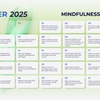Top 5 Stress Relief Strategies for Graduates

As you approach the significant milestone of graduation, the whirlwind of emotions and anticipation may bring about a mix of excitement and stress. It's completely normal to feel overwhelmed during this transitional period, but there are simple ways to relax and take it in stride. In this blog post, we will provide you with valuable insights on the best ways to relieve stress and share stress-relieving activities specifically tailored for students like yourself. Get ready to tackle graduation stress head-on and navigate this transition with confidence and ease.
WHY STUDENTS FEEL STRESS AFTER GRADUATION
Graduation marks the culmination of years of hard work and dedication, but it also signals a major shift in one's life. Students often experience stress after graduation due to various reasons.
- Uncertainty about the future: After graduation, the path ahead may seem uncertain. Questions about career choices, job prospects, further education, or even the direction of one's life can create anxiety and stress.
- Pressure to succeed: Society and personal expectations can place immense pressure on graduates to succeed immediately. The fear of not living up to these expectations can contribute to stress.
- Financial concerns: The transition from a student's lifestyle to financial independence can be daunting. Student loans, finding employment, and managing finances independently can all contribute to stress levels.
- Loss of social connections: Graduation often means leaving behind a familiar social network, including friends, classmates, and the academic community. This sense of loss can lead to feelings of isolation and loneliness.
- Identity crisis: Transitioning from a student identity to a professional or adult identity can be challenging. Graduates may feel unsure about their place in the world and struggle with finding their purpose.
HOW STRESS IMPACTS GRADUATES
Stress, if left unaddressed, can have significant impacts on various aspects of a graduate's life.
- Physical health: Prolonged stress can lead to physical health issues such as headaches, fatigue, weakened immune system, digestive problems, and sleep disturbances.
- Mental health: High levels of stress can contribute to anxiety, depression, mood swings, and decreased overall mental well-being. Graduates may also experience difficulty concentrating or making decisions.
- Relationships: Stress can strain relationships with friends, family, and significant others. It can lead to communication breakdown, increased conflicts, and feelings of irritability or withdrawal.
- Career prospects: Excessive stress can hinder job performance and satisfaction. It may affect the ability to focus, learn new skills, and adapt to new environments, potentially impacting career growth.
- Quality of life: Stress can diminish the overall quality of life by reducing enjoyment, limiting engagement in activities, and decreasing overall satisfaction.
STRATEGIES FOR POST-GRADUATE STRESS RELIEF
Given the potential impact of stress on graduates' lives, it becomes essential to proactively manage and alleviate stress during this transitional period.
The transition into post-graduation life can be overwhelming, with pressure to achieve various milestones. Remember, success is a journey, not an overnight destination. Set realistic short-term and long-term goals that align with your passions and values. Break them down into actionable steps to create structure, allowing you to focus and reduce the stress associated with overwhelming expectations.
During times of transition, having a strong support system is crucial. Surround yourself with friends, family, mentors, or online communities that offer encouragement, guidance, and a listening ear. Connecting with individuals who have experienced similar situations can provide valuable perspectives, help you find solutions, and reinforce your resilience.
Although you may be driven and eager to pursue new goals, remember the importance of self-care and mindfulness. Dedicate time to activities that nourish your mind, body, and soul. As Bill Gates wisely stated in his commencement speech, "You are not a slacker if you cut yourself some slack." Allow yourself moments of relaxation and rejuvenation to manage stress effectively.
While the above strategies can help reduce post-graduation stress, there is an additional tool to combat stress if it becomes overwhelming: TouchPoints. TouchPoints work by using a special technology called BLAST (Bi-lateral Alternating Stimulation Tactile). They send gentle vibrations to both sides of your body, which helps change how your brain reacts to stress. Instead of feeling tense and overwhelmed, TouchPoints help you feel calm and in control. With regular use, TouchPoints can teach your body to handle stress better and create healthier habits.
With the right techniques and activities, you can effectively manage stress and thrive in this new phase of your life. Set realistic goals, foster a support network, embrace mindfulness, and consider utilizing stress-management tools like TouchPoints. Take charge of your stress levels and embark on a journey of personal growth and success. Remember, graduation is just the beginning of an exciting adventure ahead!
Graduation is a significant milestone that brings forth a mix of excitement and stress. Students often feel overwhelmed during this transitional period due to uncertainties about the future, pressure to succeed, financial concerns, loss of social connections, and identity crises. The stress experienced after graduation can have detrimental effects on various aspects of their lives, including physical and mental health, relationships, career prospects, and overall quality of life.
To navigate post-graduation stress and its impacts, it's important to employ effective stress-management strategies. Setting realistic goals provides structure and alleviates the pressure of overwhelming expectations. Building a supportive network of friends, family, mentors, and communities can offer guidance and reinforce resilience. Embracing mindfulness and self-care activities nourishes the mind, body, and soul, promoting relaxation and rejuvenation.
Additionally, incorporating stress-management tools like TouchPoints can provide an extra layer of support. TouchPoints utilize BLAST technology to send gentle vibrations, shifting the brain's stress response and promoting a state of calmness and control. With consistent use, TouchPoints can help the body adapt to stress more effectively and foster healthier stress-management habits.
By implementing these strategies and seeking support, graduates can effectively manage stress, reduce its negative impacts, and embark on their post-graduation journey with confidence and optimism. Remember, graduation is not an endpoint, but the beginning of an exciting adventure filled with growth, opportunities, and personal fulfillment.
-
Posted in
Anxiety, Productivity, Stress




